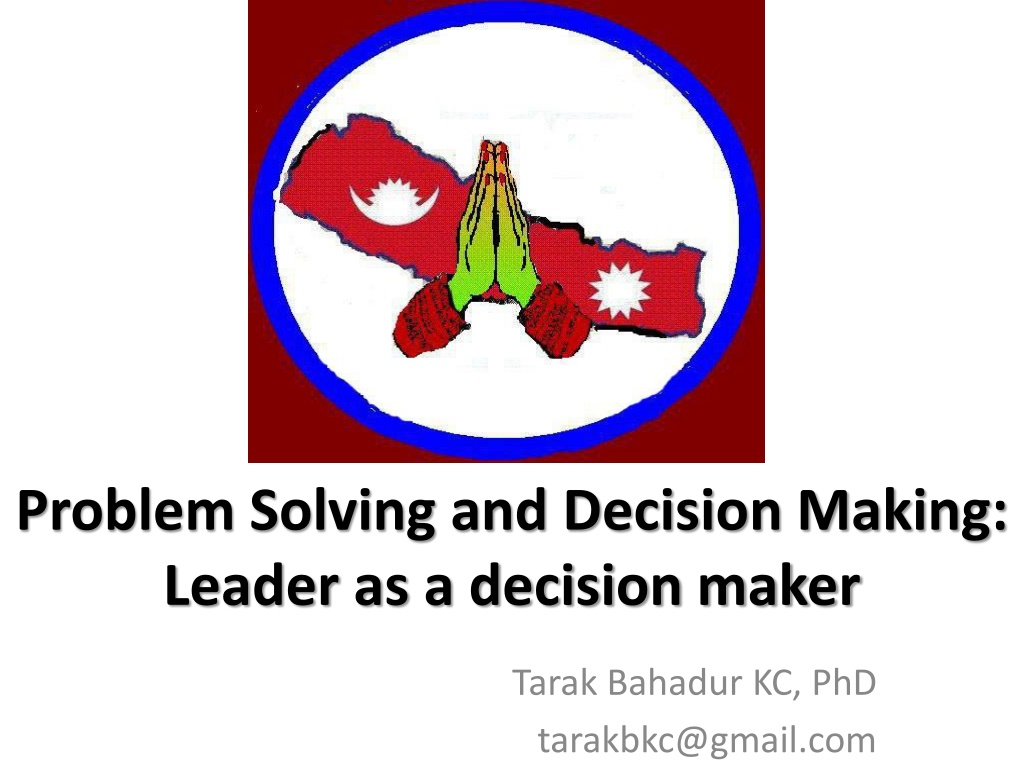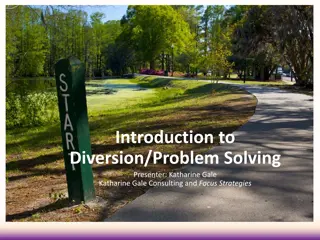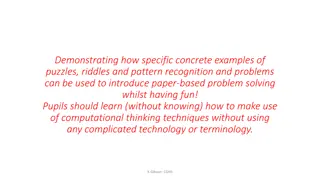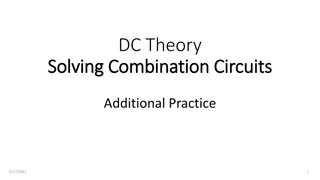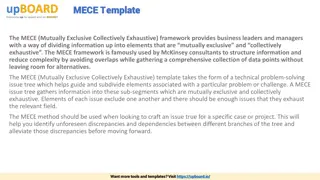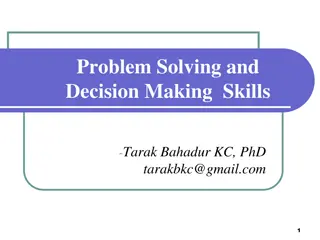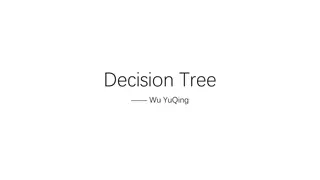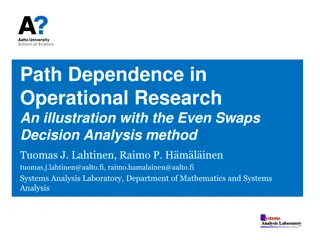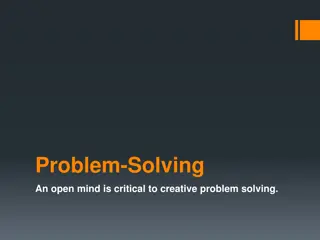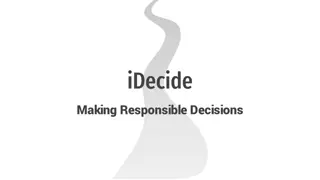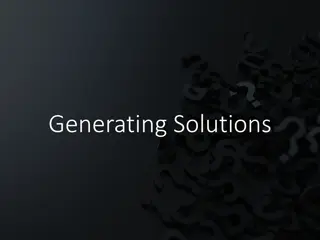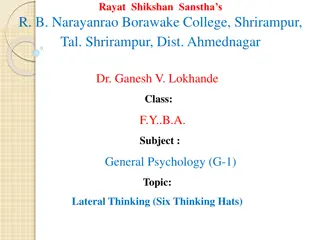Mastering the Art of Decision Making: Problem Solving Strategies
Explore the essence of decision making and problem-solving through a comprehensive session outline. Understand the importance, conditions, styles, processes, and ethical considerations in decision making. Learn how identifying problems, finding solutions, and implementing them are crucial steps in the problem-solving process. Discover the role of decision-making in everyday life and how it shapes our path towards desired outcomes.
Download Presentation

Please find below an Image/Link to download the presentation.
The content on the website is provided AS IS for your information and personal use only. It may not be sold, licensed, or shared on other websites without obtaining consent from the author. Download presentation by click this link. If you encounter any issues during the download, it is possible that the publisher has removed the file from their server.
E N D
Presentation Transcript
Problem Solving and Decision Making: Leader as a decision maker Tarak Bahadur KC, PhD tarakbkc@gmail.com
"You can't make someone else's decisions. You shouldn't let someone else make yours." - Colin Powell
Session outline Problem / Problem Solving, Decision / Decision Making Decision making: importance conditions styles process guidelines techniques Ethics in decision making 3
Problem In a day, when you don t come across any problems- you can be sure that you are traveling in a wrong path. - Swami Vivekananda A problem is a situation or a state of affairs that causes difficulties for people. It is also a gap between a current and a desired state. The gap may be viewed as the difference between 'what is' and 'what should be' or 'where we are' and 'where we want to be'. 6
Problem solving If a problem is a gap between two states, then problem solving is 'the process of closing that gap, i.e. changing the current state into the desired one. 7
When we think about typical problem- solving, it involves a series of steps. Identifying the problem... which involves making a decision on what the problem is. Finding a solution...which means making a decision on what will solve the problem. Implementing a solution... which means making a decision on how to put the plan into action. Therefore, when we talk about problem- solving, what we really mean is decision- making.
The moment we all open our eyes in the morning, the decision process begins, and continues to happen all throughout our day until we fall asleep at the end of it, whether we are aware of said process or not. We are thus all decision makers. Whether we are right decision makers or not, is not the question. However, even if one is not a right decision maker, one need not fret it is an ability that can be learned by anyone. 9
Ghanashyam Rai was working in his office. Two unknown young chaps entered in his office room. Mr. Rai welcomed them and asked the purpose of their visit. They introduced themselves as student, but their purpose of this visit was as social workers raising funds for sensitizing school boys and girls with moral values, HIV/AIDS, human trafficking, drugs, etc. in remote areas. They presented request letter seeking support by buying two dozens of correcting fluid and five dozens of pilot pen. Mr. Rai told them that his office purchases stationeries through tender. However, since the boys are working for good cause, he will buy one dozen of each item and asked his subordinate to settle the deal. After few minutes, his subordinate came and sought permission to pay the amount five times more than he was purchasing through the tender. The boys were not ready to accept the amount; they wanted their rate / price. What would you do in this case?
Goal-keeper has to decide what part to protect before the ball is kicked.
Decision A decision is one, when there are different things you can do and you pick one of them. A Decision is a Judgment -Peter Drucker A choice between or among Various alternatives 12
Types of decisions 1.Personal decisions to achieve own objectives. 2.Organisational decisions to fulfill the obligations of own position in the organisation. 13
Organizational decisions Ill-structured Top Non-programmed Decisions Level in Organization Type of Problem Programmed Decisions Well- structured Bottom 14
Programmed decision A decision that is repetitive and routine and can be made by using a definite, systematic procedure / approach. Non-programmed decision A decision that is unique, nonrecurring and novel. Generates unique responses.
Programmed vs. Non-programmed decisions Characteristics Programmed decisions Non-programmed decisions Type of problem Structured Unstructured Managerial level Lower level Upper level Frequency Repetitive New, unusual Information Readily available Ambiguous or incomplete Time frame for solution Short Relatively long Solution relies on Procedures, rules, Judgment and creativity and policies
Importance of decision making A key role of a leader. Whatever a leader does, he does through making decisions No organisations can be run without making decisions Carries long-term implications. The wellbeing of an organisation depends almost entirely on the quality of its decisions. One of the key traits that distinguish leaders from followers is the ability to make decisions independently. Leaders have a responsibility to make right decisions. 18
Decision making Decision-making is a key skill in the workplace, and is particularly important if you want to be an effective leader. Decision making is the process of making a choice between a number of options and committing to a future course of actions.
Decision making conditions Certainty A situation in which an officer can make an accurate decision because the outcome of every alternative choice is known. Risk A situation in which the officer is able to estimate the likelihood (probability) of outcomes that result from the choice of particular alternatives. Uncertainty limited information prevents estimation of outcome probabilities for alternatives associated with the problem and may force officers or rely on intuition, hunches, and gut feelings .
An effective decision making (characteristics) focuses on what is important, is logical and consistent, acknowledges both subjective and objective thinking and blends analytical with intuitive thinking, requires only as much information and analysis as is necessary to resolve a particular dilemma, encourages and guides the gathering of relevant information and informed opinion, and is straightforward, reliable, easy to use, and flexible.
Example: Identify the problem- I need a car Develop solutions: what are my options ? New / used Sedan , SUV, Hatchback, Compare alternatives: cost, mileage, reliability, etc. Decision: used Pathfinder 4 cylinder
Decision making style People make decisions using different styles: 1. Some like to be logical and rank their options using a scale 2. Others like to use more subjective factors like their feelings and gut instincts 3. Yet another method would be to speak with others whose ideas / options you respect and trust
Exercise : Let us try the following exercise to better understand our own DM style Write down two important decisions you have made over the last few months / years. 1. 2. Think about how you made each of these decisions. What styles did you use? Did you start with one method and then switch to another ?
Write down how the process worked for the each decision. How well did this method (s) work? Did you get what you wanted? If you switched to another method, could the outcomes be improved?
It is a good approach to use all three methods in making decisions. First, look at options objectively in terms of how it measures up to your desires, priorities and needs. Then look at options and gauge which options feel right. Finally, consult a few people you believe would have the ability to help you accurately assess your options.
As an officer, sometimes we know everything. Sometimes we know only something, but not everything. And sometimes we know absolutely nothing. But, we still have to decide. 27
Basic decision making styles / approaches Command No consultation. Collaborative Joint / Mutual. Consensus Consensus-based decision-making is done more like a democratic vote. Majority rules. Convenience Complete delegation. Choosing a right style depends on different things, such as: nature of organisation, issue, situation, leader himself,
Common decision making errors and biases Overconfidence Immediate satisfaction Anchoring effect Selective perception Representation Randomness Self-serving Retrospection
Making right decisions What is problem / wrong? What is the cause? What is the best, affordable, feasible and practical solution?
Scan internal and external situation Is a decision required? No Yes Is it a routine decision? No Yes Follow existing programmed decision rule Create a non-programmed decision through problem solving Monitor results
Exercise: Check your decision making skill? SN 1 Particulars Yes No Do you often try to avoid or delay making important decisions, and even hope that problems will go away? When required to make a decision fairly promptly, do you become flustered, and fail to function at your best? Would you consider it demeaning to consult your subordinates regarding a problem with which they have experience? In deciding a complicated problem where strong arguments exist for either side, would you trust your gut feeling? Do you often wish that you didn t have to make any decisions? When faced with a serious decision, are your sleep and appetite usually adversely affected? Do you secretly dislike making decisions because you lack self confidence? Are you uneasy even when required to make unimportant decisions? Would you fire a friend if his continued employment was against the welfare of the enterprise in which you hold a high position? When baffled by a problem within your jurisdiction, would you try to pass it off to others? At home, do you participate in all or most of the important decisions? Are you usually edgy both before and after making important decisions? 2 3 4 5 6 7 8 9 10 11 12
You can't make decisions based on fear and the possibility of what might happen. -Michelle Obama 34
Guideline for making decision more effective Categorical interpretation - the problem should be defined properly. Application of limiting factor - limiting factor should be taken into account in order to analyze the external S &W. Adequate information - more quantity of reliable information leads to effective decision making. Considering other views - various views at the same point are taken into account for quality decision. Timeliness - decision should be, made at proper time to meet the competitive advantages.
Techniques for improving decision making Brainstorming - idea generation for decision making. Nominal group technique (NGT)- problem outlined, presentation of solution in written form, discussion over written solutions, and final decision. Delphi technique - decision made on the basis of questionnaire filled by the respondents. Consensus mapping- decision made on the basis of the report presented by the representative of each group.
Ethics in decision making Keeping promises Not being deceitful Treating others as they wish to be treated Not blaming others Making informed decisions without favoritism Working to make the organizational environment better Operating within the law Minimizing hardships and helping others when possible
Before making a difficult decision, consider asking yourself the following questions: Does your decision conflict with any of the core ethical values? Think of someone whose moral judgment you respect. What would that person do? How will your decision affect others? Ask yourself: Are my actions legal? Are there regulations, rules, or policies that restrict your choices / actions?
Would your decision be perceived as unethical? How would your decision look if it were reported on the news or in another public forum? What would a reasonable person do? How would they perceive your decision? Would you be proud of your choice if your child were to find out? Would you want them to make the same choice? Could you rationally and honestly defend your decision?
Think Laterally and be Creative Krishna Seekh - Impact of decision making in our lives Good Luck 40
Bases of decision making (Nepal) Constitution Acts, Rules, Policies, Najir Court / Executive order Budgetary instruments Administrative procedures International conventions, declarations and commitments Treaties/ MOUs with international communities / agencies Parliamentary directives CIAA / NVC directions, etc. 41
Tools (Nepal) Tippani Cabinet Proposal Minutes Tok-aadesh Verbal order 42
